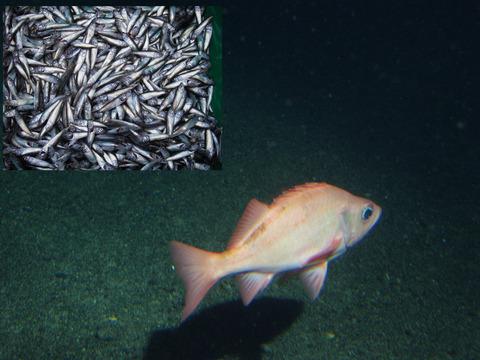当前位置:
X-MOL 学术
›
Ecol. Evol.
›
论文详情
Our official English website, www.x-mol.net, welcomes your
feedback! (Note: you will need to create a separate account there.)
Long-lived marine species may be resilient to environmental variability through a temporal portfolio effect.
Ecology and Evolution ( IF 2.3 ) Pub Date : 2020-05-25 , DOI: 10.1002/ece3.6378 Jacek Maselko 1, 2 , Kimberly R Andrews 3 , Paul A Hohenlohe 3, 4
Ecology and Evolution ( IF 2.3 ) Pub Date : 2020-05-25 , DOI: 10.1002/ece3.6378 Jacek Maselko 1, 2 , Kimberly R Andrews 3 , Paul A Hohenlohe 3, 4
Affiliation

|
Maintenance of genetic variation may provide resilience of populations to natural environmental variability. We used Pacific ocean perch (POP; Sebastes alutus ) to test for the maintenance of adaptive variation across overlapping generations. POP are a long‐lived species characterized by widespread larval dispersal in their first year and a longevity of over 100 years. In order to understand how early marine dispersal affects POP survival and population structure, we used restriction site‐associated DNA sequencing (RADseq) to obtain 11,146 single‐nucleotide polymorphisms (SNPs) from 401 young‐of‐the‐year (YOY) POP collected during surveys conducted in 2014 (19 stations) and 2015 (4 stations) in the eastern Gulf of Alaska. Population clustering analysis showed that the POP samples represented four distinct ancestral populations mixed throughout the sampling area. Based on prior work on larval dispersal of POP, these larvae are most likely from distinct parturition locations that are mixing during their pelagic dispersal life stage. Latent factor mixed models revealed that POP larvae face significant selection during their first year at sea, which is specific to the year of their birth. Thus each adult cohort's genetic composition is heavily influenced by the environmental conditions experienced during their first year at sea. Long‐lived species relying on broadcast spawning strategies may therefore be uniquely resilient to environmental variability by maintaining a portfolio of cohort‐specific adaptive genotypes, and age truncation due to overfishing of older cohorts may have detrimental effect on the population viability.
中文翻译:

长寿的海洋物种可能通过时间组合效应对环境变化具有弹性。
遗传变异的维持可以提高种群对自然环境变化的适应能力。我们使用太平洋鲈鱼(POP; Sebastes alutus )来测试重叠世代之间适应性变异的维持。 POP 是一种长寿物种,其特点是幼虫在第一年就广泛传播,寿命可达 100 多年。为了了解早期海洋扩散如何影响 POP 的生存和种群结构,我们使用限制性位点相关 DNA 测序 (RADseq) 从收集的 401 名青年 (YOY) POP 中获得了 11,146 个单核苷酸多态性 (SNP) 2014 年(19 个站)和 2015 年(4 个站)在阿拉斯加湾东部进行的调查期间。群体聚类分析表明,POP 样本代表了整个采样区域混合的四个不同的祖先群体。根据之前关于 POP 幼虫扩散的研究,这些幼虫很可能来自不同的分娩地点,这些地点在其远洋扩散生命阶段混合在一起。潜在因素混合模型显示,POP 幼虫在海上的第一年面临着重大选择,这是特定于其出生年份的。因此,每个成年群体的遗传组成很大程度上受到他们在海上第一年经历的环境条件的影响。因此,依赖广播产卵策略的长寿物种可能通过维持特定种群的适应性基因型组合来对环境变化具有独特的弹性,而由于过度捕捞较老种群而导致的年龄截断可能会对种群生存能力产生不利影响。
更新日期:2020-07-25
中文翻译:

长寿的海洋物种可能通过时间组合效应对环境变化具有弹性。
遗传变异的维持可以提高种群对自然环境变化的适应能力。我们使用太平洋鲈鱼(POP; Sebastes alutus )来测试重叠世代之间适应性变异的维持。 POP 是一种长寿物种,其特点是幼虫在第一年就广泛传播,寿命可达 100 多年。为了了解早期海洋扩散如何影响 POP 的生存和种群结构,我们使用限制性位点相关 DNA 测序 (RADseq) 从收集的 401 名青年 (YOY) POP 中获得了 11,146 个单核苷酸多态性 (SNP) 2014 年(19 个站)和 2015 年(4 个站)在阿拉斯加湾东部进行的调查期间。群体聚类分析表明,POP 样本代表了整个采样区域混合的四个不同的祖先群体。根据之前关于 POP 幼虫扩散的研究,这些幼虫很可能来自不同的分娩地点,这些地点在其远洋扩散生命阶段混合在一起。潜在因素混合模型显示,POP 幼虫在海上的第一年面临着重大选择,这是特定于其出生年份的。因此,每个成年群体的遗传组成很大程度上受到他们在海上第一年经历的环境条件的影响。因此,依赖广播产卵策略的长寿物种可能通过维持特定种群的适应性基因型组合来对环境变化具有独特的弹性,而由于过度捕捞较老种群而导致的年龄截断可能会对种群生存能力产生不利影响。











































 京公网安备 11010802027423号
京公网安备 11010802027423号